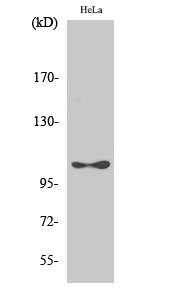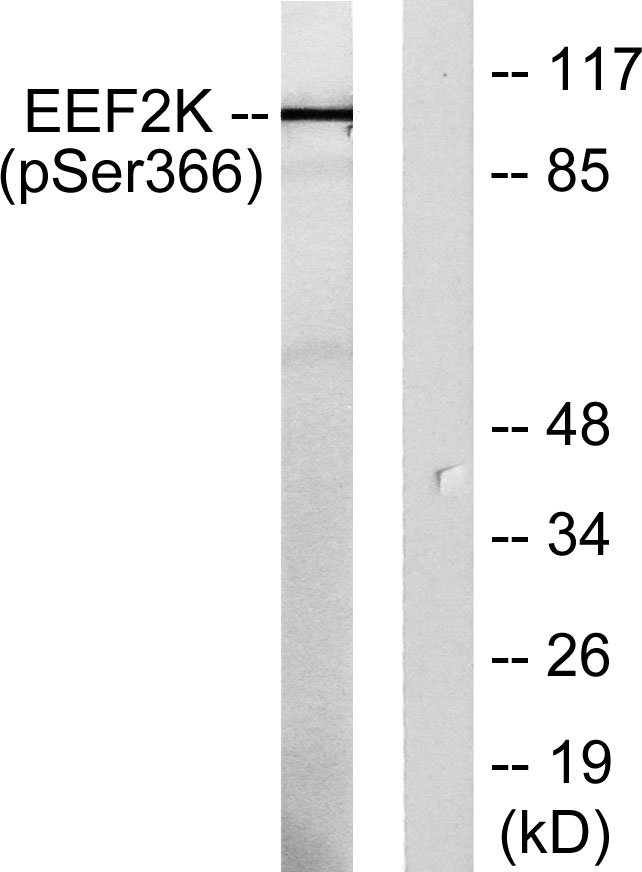eEF2K (phospho Ser366) Polyclonal Antibody
- Catalog No.:YP0599
- Applications:WB;IHC;IF;ELISA
- Reactivity:Human;Rat
- Target:
- eEF2K
- Fields:
- >>AMPK signaling pathway;>>Oxytocin signaling pathway
- Gene Name:
- EEF2K
- Protein Name:
- Eukaryotic elongation factor 2 kinase
- Human Gene Id:
- 29904
- Human Swiss Prot No:
- O00418
- Mouse Swiss Prot No:
- O08796
- Rat Gene Id:
- 25435
- Rat Swiss Prot No:
- P70531
- Immunogen:
- The antiserum was produced against synthesized peptide derived from human eEF2K around the phosphorylation site of Ser366. AA range:331-380
- Specificity:
- Phospho-eEF2K (S366) Polyclonal Antibody detects endogenous levels of eEF2K protein only when phosphorylated at S366.
- Formulation:
- Liquid in PBS containing 50% glycerol, 0.5% BSA and 0.02% sodium azide.
- Source:
- Polyclonal, Rabbit,IgG
- Dilution:
- WB 1:500 - 1:2000. IHC 1:100 - 1:300. ELISA: 1:40000.. IF 1:50-200
- Purification:
- The antibody was affinity-purified from rabbit antiserum by affinity-chromatography using epitope-specific immunogen.
- Concentration:
- 1 mg/ml
- Storage Stability:
- -15°C to -25°C/1 year(Do not lower than -25°C)
- Other Name:
- EEF2K;Eukaryotic elongation factor 2 kinase;eEF-2 kinase;eEF-2K;Calcium/calmodulin-dependent eukaryotic elongation factor 2 kinase
- Observed Band(KD):
- 105kD
- Background:
- This gene encodes a highly conserved protein kinase in the calmodulin-mediated signaling pathway that links activation of cell surface receptors to cell division. This kinase is involved in the regulation of protein synthesis. It phosphorylates eukaryotic elongation factor 2 (EEF2) and thus inhibits the EEF2 function. The activity of this kinase is increased in many cancers and may be a valid target for anti-cancer treatment. [provided by RefSeq, Jul 2008],
- Function:
- catalytic activity:ATP + [elongation factor 2] = ADP + [elongation factor 2] phosphate.,enzyme regulation:Undergoes calcium/calmodulin-dependent intramolecular autophosphorylation, and this results in it becoming partially calcium/calmodulin-independent.,function:Phosphorylates eukaryotic elongation factor-2. Binds calmodulin.,similarity:Belongs to the protein kinase superfamily. Alpha-type protein kinase family.,similarity:Contains 1 alpha-type protein kinase domain.,subunit:Monomer or homodimer .,
- Subcellular Location:
- cytoplasm,cytosol,postsynaptic density,
- Expression:
- Epithelium,Glial tumor,Lymph,T-cell,
- June 19-2018
- WESTERN IMMUNOBLOTTING PROTOCOL
- June 19-2018
- IMMUNOHISTOCHEMISTRY-PARAFFIN PROTOCOL
- June 19-2018
- IMMUNOFLUORESCENCE PROTOCOL
- September 08-2020
- FLOW-CYTOMEYRT-PROTOCOL
- May 20-2022
- Cell-Based ELISA│解您多样本WB检测之困扰
- July 13-2018
- CELL-BASED-ELISA-PROTOCOL-FOR-ACETYL-PROTEIN
- July 13-2018
- CELL-BASED-ELISA-PROTOCOL-FOR-PHOSPHO-PROTEIN
- July 13-2018
- Antibody-FAQs
- Products Images

- Western Blot analysis of various cells using Phospho-eEF2K (S366) Polyclonal Antibody diluted at 1:1000

- Enzyme-Linked Immunosorbent Assay (Phospho-ELISA) for Immunogen Phosphopeptide (Phospho-left) and Non-Phosphopeptide (Phospho-right), using eEF2K (Phospho-Ser366) Antibody

- Immunohistochemistry analysis of paraffin-embedded human breast carcinoma, using eEF2K (Phospho-Ser366) Antibody. The picture on the right is blocked with the phospho peptide.

- Western blot analysis of lysates from HeLa cells treated with serum 10% 15', using eEF2K (Phospho-Ser366) Antibody. The lane on the right is blocked with the phospho peptide.



